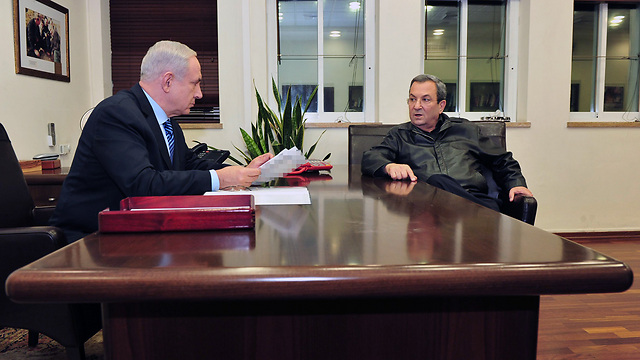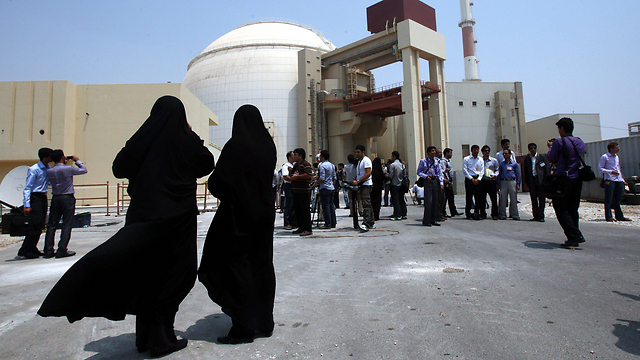
Ehud Barak and Benjamin Netanyahu (Photo: Ariel Hermoni/Defense Ministry)
צילום: אריאל חרמוני, משרד הביטחון
The Iran strike that never was
Op-ed: Ehud Barak's interview outtakes shown on Channel 2 News tell a skewed version of what happened when the government decided to avoid striking Iran's nuclear sites.
Meir Dagan, Yuval Diskin, Gabi Ashkenazi, Benny Gantz, Gadi Eisenkot, Amir Eshel, Aviv Kochavi, Tamir Pardo, Dan Meridor, Benny Begin, Yuval Steinitz, Moshe Ya’alon - these are the real Israeli patriots when it comes to attacking Iran’s nuclear sites, attacks that did not happen.

Plans of attack were discussed three times: In 2010, 2011, and 2013. Allegedly, the top three members of government urged the approval of these plans with all the vigor they could muster. I say "allegedly" because the members in question are Benjamin Netanyahu, Ehud Barak, and Avigdor Lieberman, three men for whom "allegedly" is practically a middle name.
The discussions focused on two questions, one obvious and one crucial. The obvious question was what Barak calls “operational readiness” – can the IDF significantly damage the nuclear sites and bring its pilots back home safely. The crucial question was what is it good for, what will the results of the strike be if it’s successful, what will be the impact on the Iranian nuclear program, what will happen to the Middle East.
The interview outtakes of Ehud Barak speaking to Ilan Kfir and Danny Dor, two journalists who have written a new biography of him, which were recently aired on Channel 2 News, focus on the less crucial first question.
Those who hear the outtakes might come to three conclusions: First, that there was some patent, a magic wand, a brilliant operation with which a single blow could have been landed and with it destroy an existential threat to Israel. Second, that there were three brave ministers, determined spirits with the will to take action, but a group of cowardly politicians prevented them from doing so. And third, that among these three was an internal division: Barak was trying his hardest to get the operation greenlit, Lieberman didn’t do very much, and Netanyahu failed as a leader.
Wrong, wrong, wrong.
The main point raised against an attack on Iran was that it would do more harm than good: The moment Israel attacked, Iran would have been free to push its nuclear program forward at full force while claiming self defense. In two years, at the most, it would have manufactured its first bomb. Had we attacked in 2010, Iran would have been nuclear in 2013; had we attacked in 2013, it would have been nuclear today, without binding agreements or international oversight.
The Israeli strike could have borne fruit only if it had dragged the United States into war. Israel attacks, Iran retaliates harshly against the Israeli populace, the US is forced to stand with its ally and commit its full military power. The participants in the discussions that took place had to suspect that this was Netanyahu and Barak’s real goal, that this was the gamble. Otherwise, the Israeli attack had no purpose.

Netanyahu and former defense minister Barak (Photo: Ariel Hermoni, Defense Ministry) (צילום: אריאל חרמוני, משרד הביטחון)
The Israeli tail wanted to wag the American dog and start a regional war, one whose end was unknown. If Churchill could recruit Roosevelt into the fight against Hitler, Netanyahu will force Obama into fighting Khamenei. But Obama isn’t Roosevelt, Netanyahu isn’t Churchill, and Khamenei isn’t Hitler. It’s all talk.
The heads of the defense establishment who participated in the discussions didn’t want to be seen as cowards. Therefore, they supported spending billions on purchases and training meant to bring the IDF to full operational preparedness. A large part of this investment went down the drain. We can take comfort in the fact that knowledge of the preparations for a possible Israeli attack contributed somewhat to the severity of the sanctions imposed on Iran.
Barak is a dangerous kind of person to drive behind. The kind who might signal left, turn the steering wheel in that direction, and still turn right in the end, or the other way around. It’s doubtful whether we’ll ever know if he really wanted military action, or if he hoped that Netanyahu would back out in the last moment and save him from being responsible for a catastrophe.
The prime minister holds a crucial role in this kind of decision. Ben-Gurion passed every important decision he supported through government votes during the 1948 Independence War, including the decisions on the Altalena Affair and the dissolution of the Palmach. On one decision, a majority of ,inisters voted “no”: Conquering Mount Hebron. They saw that the prime minister was ambivalent. Ben-Gurion would go on to accuse his government of creating an "endless tragedy," but the ministers knew the truth.
When all the defense chiefs oppose a military operation, the prime minister knows that if it fails, he won’t have anyone to share the blame. Everything will land in his lap. Menachem Begin took that risk when he chose to strike Iraq’s nuclear reactor. He gambled and won.
It’s easier to overcome opposition by ministers. When Netanyahu can’t convince Steinitz, there’s no escaping this conclusion: Either Steinitz is, deep down, very conniving – Che Guevara Steinitz – or Netanyahu, influenced by his own motivations, didn’t really try.











